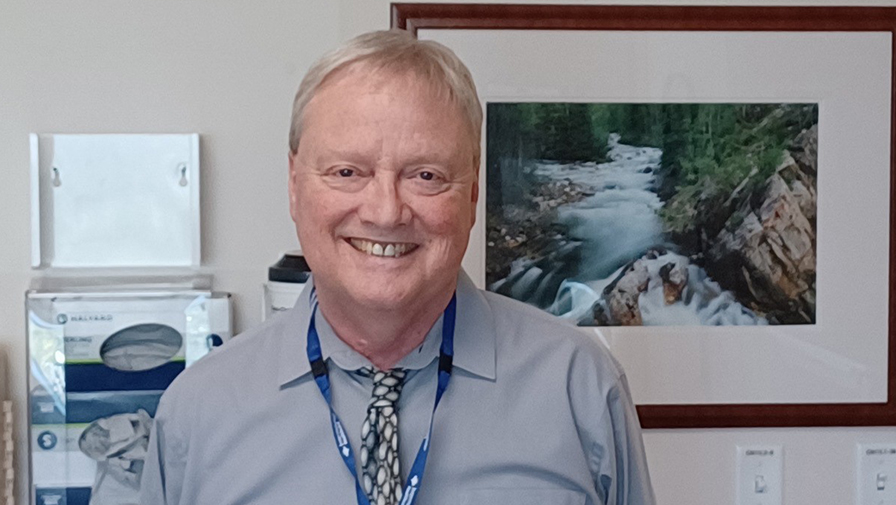
Intermountain chaplains often try to help people in need think about what they really deeply believe, even if those beliefs have nothing to do with God or a particular faith. They don’t preach, but they do practice their faith as they reach out with compassion to those in need.
At least that’s the case with Chaplain Wes Wilde who works in palliative care at Intermountain Medical Center. Often he’s speaking with people who have a terminal diagnosis; patients who are dealing with “colossal change” in their lives.
He says people tend to have their own beliefs about what happens after death, if anything, and, even though they may be practicing members of a faith that has clearly defined doctrine on the matter, their own ideas may be different. He doesn’t seek to redirect people but just help them consider what they truly believe.
“What’s your personal belief in an afterlife?” Chaplain Wilde often asks. “Do you feel you’re moving on somewhere after you die? Do you have a religious tradition? Are your views pretty similar to that or do you have your own personal theological understanding about the afterlife?”
By unjudgmental listening, Chaplain Wilde has learned what people believe and what many religions teach about the afterlife.
“In most cases, these are times when patients can assure themselves and remind themselves that yes, they do have faith,” he says. “We talk about what’s death to you and what do you think is going to happen. Are you afraid of dying? What scares you specifically about that? None of the answers come from me. My job isn’t to give them the answers. My job is to simply help them draw the answers from themselves. Most people have the answers to their own questions.”
He tries to help those who fear what will happen after they die.
“Some will say, ‘I’m afraid of judgment’ or some folks will say, ‘I haven’t done enough in this life,’” he says. “Some folks will say, ‘I’ve just been a bad person. I haven’t lived up to the type of person I should have been. I haven’t been good with my family. I’ve alienated people.’”
Sometimes he can help people with unfinished business get some resolution.
“Are there things you need to resolve such as conflicts you’ve had with family members or friends?” he’ll ask. “Are there apologies you need to hear or offer? How do we close the book on broken relationships? It’s a time for people to think deeply about tat so when their time does come, there’ll be no regrets.”
Chaplaincy isn’t connected to any particular faith or denomination, he says. Chaplains aren’t there to tell people what they should be feeling or doing.
“I think some people think we're in there to preach to people,” he says “People who think we’re in there with an agenda couldn’t possibly be further from the truth. If we, as professional chaplains go in with an agenda, we’re doing it wrong from the outset. We go in and we go where the patient wants to go. We’re not there to fix their body, we’re not there to solve their problems economically or socially. We’re simply in there to be support wherever they need it.”
He says some people don’t have a particular faith but find peace on a golf course on Sunday.
“That’s their church,” he says. “That’s what they find sacred and we talk about why that is. ‘Well, it’s beautiful out there and the morning is crisp, and I feel alive and I might see deer out there and it’s beautiful,’” they may say. It’s never about me; It’s always about them.”
He says sometimes he’s asked just to sit with a patient who’s near death. Often he helps family members who are wrestling with end-of-life decisions.
“Part of my job is to walk them through it,” he says.
If a patient is of a particular faith and needs help, he usually knows who to call. If a member of the Church of Jesus Christ of Latter-day Saints, for example, asks for a “blessing,” he knows who to contact.
“If they want last rites from a priest and I can help, I’m happy to do that,” he says.
Sometimes they might want their Lutheran minister or their Baptist pastor to come out and he tries to find the right person for them.
He doesn’t know about the teachings of every faith but when he doesn’t know what a denomination teaches, he considers that a “great opportunity” to learn.
“I wonder if you could educate me a little bit about your traditions,” he’ll say. “So, it’s a learning point for me and it helps them to explain their faith and to maybe revisit their own tradition if they haven’t in a while. It’s about respect and understanding what they find to be sacred. Not my sacredness, theirs.”
He says the work can be emotionally taxing and he has to guard himself not to get lost in the grief someone else is experiencing.
Chaplain Wilde meets on a regular basis with other Intermountain chaplains and they look for ways to quantify what they’re doing and the impact it’s having. Chaplains are required to go through an accredited clinical pastoral education program that teaches them how to work within a healthcare system and to do things like charting.
He says Intermountain plans to hire more chaplains systemwide next year and add a chaplain supervisor to oversee that effort. He says soon Intermountain Medical Center will have three chaplains working there.
Chaplain Wilde says there are three kinds of chaplains who work at Intermountain. Some work in palliative care, as he does. Some work in hospice and others are hospital chaplains. Even though Chaplain Wilde works in palliative care he’ll often go help in another area if he knows of a need there.
This week is Spiritual Care Week, a time to remember those who serve and help others in need.

